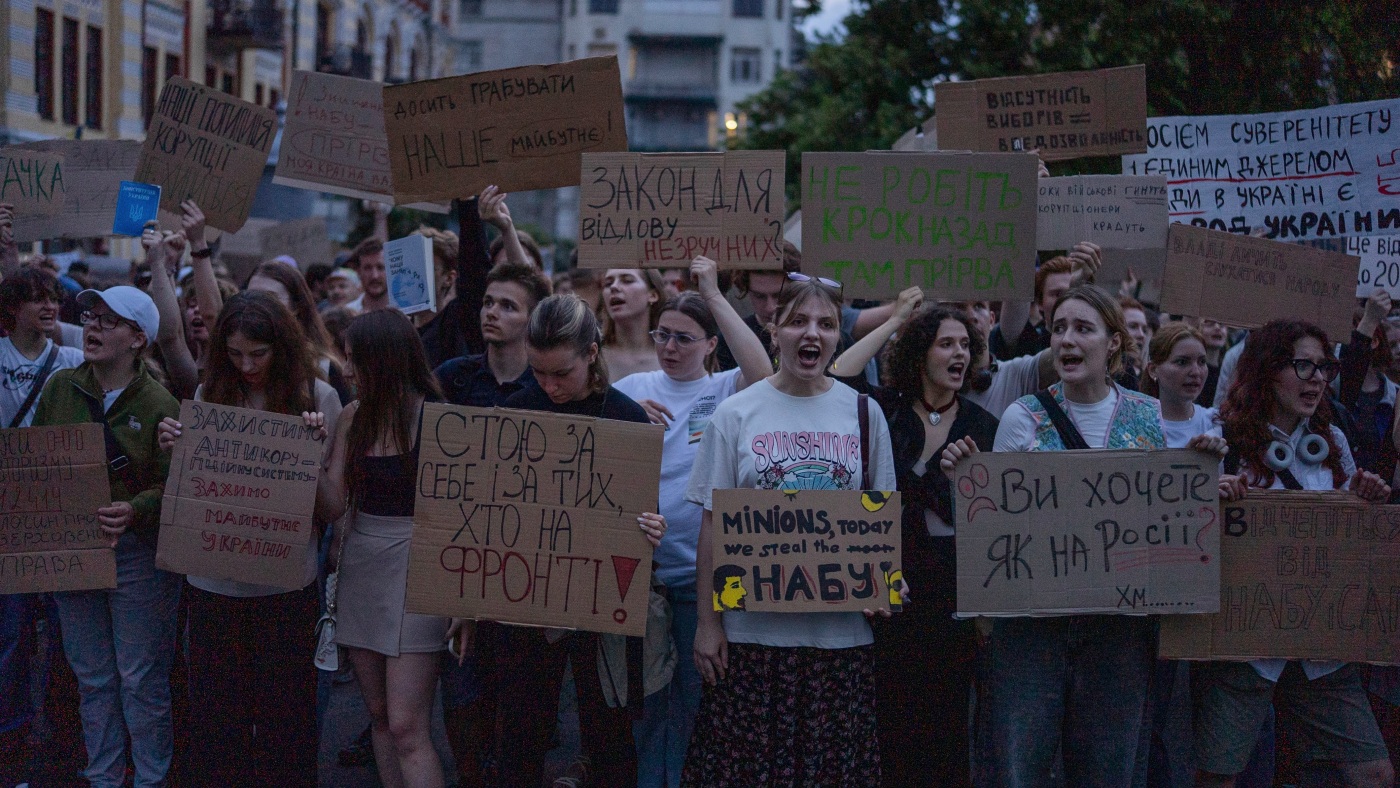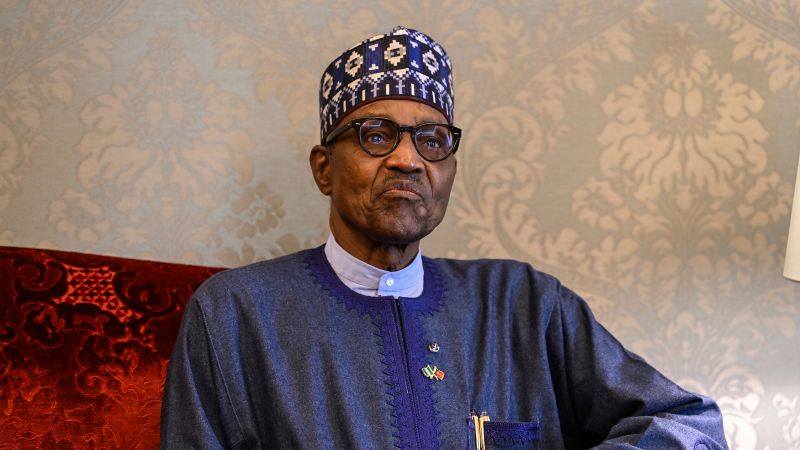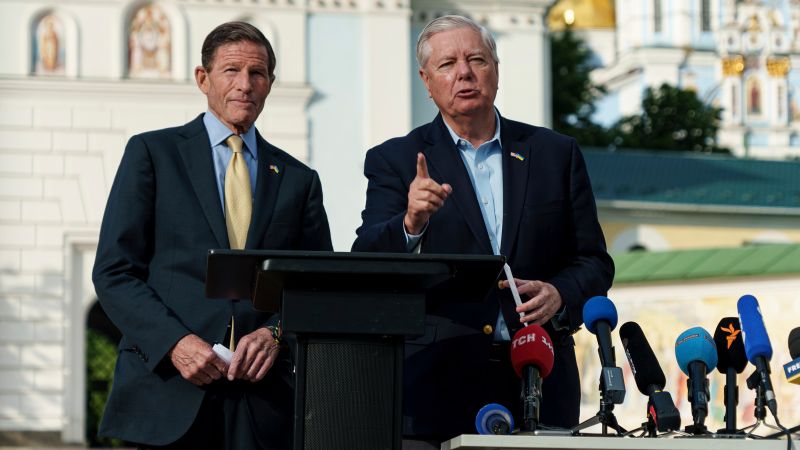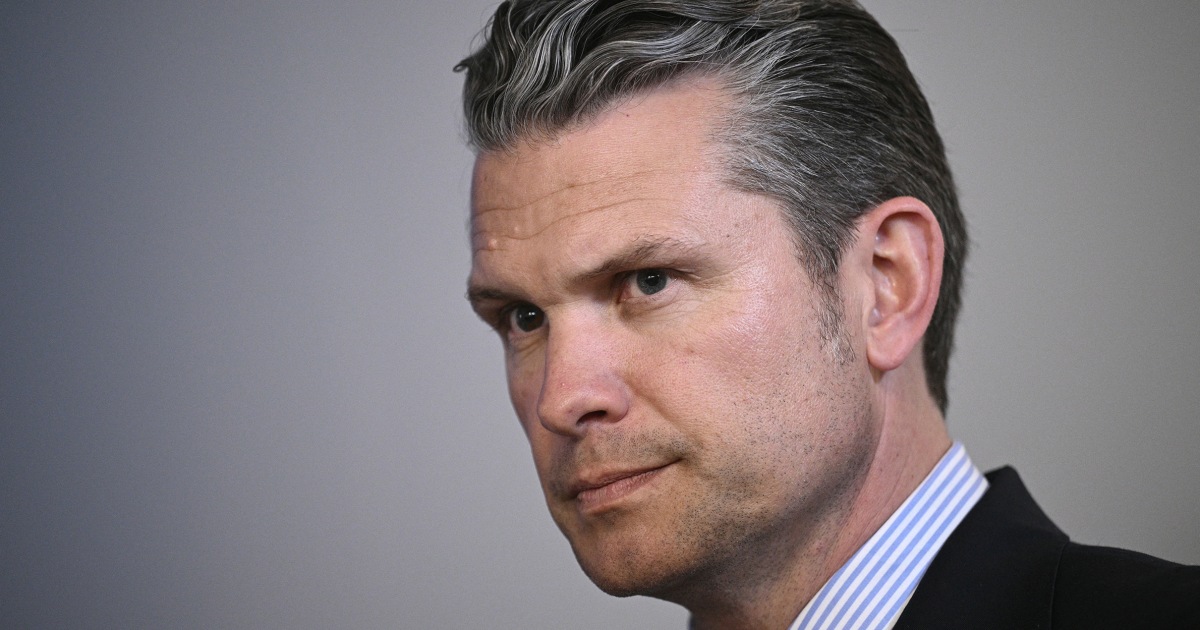Ukrainian President Volodymyr Zelenskyy Reverses Power Grab of Anti-Corruption Agencies

Introduction
After facing fierce public backlash, Ukrainian President Volodymyr Zelenskyy has made a U-turn on a controversial power grab that threatened the independence of the country's anti-corruption agencies. The move comes just two days after Zelenskyy signed the changes into law, signaling a swift reversal in response to widespread criticism.
Key Details
The bill introduced by Zelenskyy aims to reverse the changes made to the National Anti-Corruption Bureau and the Specialized Anti-Corruption Prosecutor's Office, which would have allowed the president to appoint their heads and influence their investigations. This move had sparked concerns about the weakening of these agencies, which were established to fight corruption in Ukraine.
The sudden change of heart by Zelenskyy has been met with both relief and skepticism. While it is being hailed as a victory for public pressure and civil society, some see it as a strategic move to avoid further criticism and maintain relations with the International Monetary Fund.
Impact
The reversal of the power grab is a positive step towards preserving the integrity and effectiveness of Ukraine's anti-corruption agencies. It also serves as a reminder of the power of public opinion and the importance of strong checks and balances in a democratic society. However, it also highlights the ongoing challenges and political tensions in the country, as well as the influence
About the People Mentioned
Volodymyr Zelenskyy
Volodymyr Oleksandrovych Zelenskyy, born on January 25, 1978, in Kryvyi Rih, Ukraine, is a Ukrainian politician and former entertainer. He is the sixth president of Ukraine, having taken office in 2019. Before entering politics, Zelenskyy was a well-known comedian, actor, screenwriter, film producer, and director. He graduated with a law degree from Kyiv National Economic University in 2000 but never practiced law. Instead, he co-founded the production company Kvartal 95, which produced films, cartoons, and TV shows, including the popular series "Servant of the People," where he played a fictional Ukrainian president. Zelenskyy's political career began when he announced his candidacy for the 2019 presidential election on New Year's Eve in 2018. He positioned himself as an anti-establishment and anti-corruption figure, which resonated with the public. He won the election with a landslide victory of 73.23% in the second round, defeating incumbent President Petro Poroshenko. Upon taking office, Zelenskyy dissolved the Verkhovna Rada and called for snap elections, which resulted in his party, Servant of the People, gaining an absolute majority in parliament. As president, Zelenskyy has faced significant challenges, including the ongoing conflict with Russia. His leadership during the full-scale Russian invasion of Ukraine, which began in February 2022, has made him a global figure of resistance. He has been recognized for his efforts, including being named Time Magazine's Person of the Year in 2022. Zelenskyy is married to Olena Zelenska and has two children. His presidency has been marked by a strong focus on national unity and international diplomacy to secure support for Ukraine during the ongoing conflict.
About the Organizations Mentioned
National Anti-Corruption Bureau
The **National Anti-Corruption Bureau of Ukraine (NABU)** is a specialized law enforcement agency established to combat high-level corruption in Ukraine. It was created in 2015 following the adoption of the Law “On the National Anti-Corruption Bureau of Ukraine” in 2014, as part of Ukraine’s commitments to the European Union to address systemic corruption and facilitate EU integration[2][4]. NABU’s main mission is to prevent, detect, investigate, and expose corruption crimes committed by top officials, including former presidents, members of parliament, government ministers, and heads of key state institutions[4]. NABU operates with investigative powers but does not have prosecutorial authority; it prepares cases for prosecution which are then handled by the Specialized Anti-Corruption Prosecutor’s Office (SAPO)[2]. The bureau initially started with about 70 detectives and is planned to grow to an authorized staff of 700. Its funding is supported by the Ukrainian government alongside international aid from the United States and the European Union, and it cooperates internationally, including an evidence-sharing agreement with the FBI[2]. Key functions of NABU include conducting pre-trial investigations, carrying out police operations, searching and arresting corrupt assets, safeguarding evidence, and ensuring confidentiality for whistleblowers[2]. The agency also engages in informational and analytical work and reports regularly to the public to maintain transparency[2][4]. NABU has played a critical role in Ukraine’s anti-corruption framework alongside other institutions like the National Agency on Corruption Prevention and the High Anti-Corruption Court, forming an integrated system to address corruption at the highest levels[5]. Since its inception, NABU has contributed to the exposure and investigation of numerous corruption cases involving senior officials, helping to raise public awareness and trust in Ukraine’s institutional reforms[10]. Notably, NABU is recognized for its institutional independence and is subject to annual independent audits to assess its effectiveness and operational autonomy, reinforcing it
Specialized Anti-Corruption Prosecutor's Office
The **Specialized Anti-Corruption Prosecutor's Office (SAPO)** is a pivotal institution in Ukraine's fight against corruption, established in 2015 as part of broader anti-corruption reforms. SAPO's primary mandate is to prosecute high-level corruption cases, including criminal offenses committed by senior public officials and those that threaten national security[2][4]. Historically, SAPO was created alongside the National Anti-Corruption Bureau of Ukraine (NABU) to address corruption within central and local government institutions, a condition set by the International Monetary Fund and European Commission for visa liberalization[4]. SAPO's role involves supervising investigations conducted by NABU detectives and ensuring compliance with the law during pre-trial investigations. It also represents the prosecution in court[1]. Despite being part of the Prosecutor General's Office, SAPO operates independently, with appointments made through open competitions[1][4]. Notable achievements include the launch of hundreds of investigations against corruption, often in collaboration with international bodies[7]. In 2024, SAPO was reorganized as an independent prosecutorial body, enhancing its autonomy and international cooperation[2]. However, recent legislative changes have raised concerns about SAPO's independence, with the Prosecutor General gaining more powers[6]. SAPO's current status reflects ongoing efforts to balance independence with institutional reform. Despite these challenges, SAPO remains crucial in Ukraine's anti-corruption agenda and its integration efforts with the European Union[5][6]. The organization's ability to collaborate internationally and its role in advancing Ukraine's anti-corruption reforms make it a significant player in the country's legal landscape.
International Monetary Fund
The **International Monetary Fund (IMF)** is a global financial institution founded in 1945 with 191 member countries. Its core mission is to promote international monetary cooperation, secure financial stability, facilitate international trade, encourage sustainable economic growth, and reduce global poverty[1][2]. The IMF emerged from the 1944 Bretton Woods Conference, initially overseeing the fixed exchange rate system, and has since evolved into a crucial institution managing balance-of-payments crises and supporting countries through economic challenges[2]. The IMF operates by pooling financial resources from its members through a quota system, which determines both their financial contributions and voting power. When member countries face balance-of-payments problems, the IMF provides loans and concessional financial assistance to stabilize economies[1][2]. These loans often come with policy reform requirements, known as structural adjustments, aimed at restoring economic stability and growth. Besides lending, the IMF plays a vital role in economic surveillance by continuously monitoring global and regional financial developments and advising governments on sound economic policies[1]. It also offers technical assistance and training to strengthen member countries' economic institutions in areas such as taxation, monetary policy, and financial regulation[1]. Key achievements of the IMF include its pivotal role in maintaining global financial stability during various crises, including the post-World War II reconstruction, the transition after the collapse of the Bretton Woods system, and ongoing support amid globalization challenges[2]. The IMF’s World Economic Outlook reports provide influential analysis and forecasts impacting business and policy decisions worldwide[3][4][5][6]. Currently headquartered in Washington, D.C., the IMF remains a central actor in global economic governance, fostering dialogue among nations and adapting to emerging challenges such as inflation, fiscal sustainability, and technological changes affecting economies[1][3][4]. Its ability to blend financial support, policy advice, and capacity development makes it indispensable for countries navigating complex economic landscapes.













